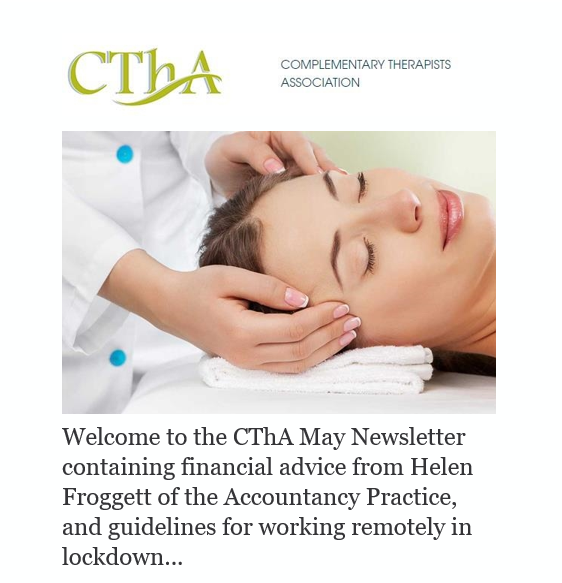Newsletter contents with advice from The Accountancy Practice for CThA members

Newsletter from the Complementary Therapists Association May 2020. The COVID-19 pandemic is having a profound effect on the lives of millions of people around the world and the restrictions to daily life have forced us to quickly adopt different ways of working, learning and connecting with each other. This crisis has brought unprecedented challenges both for people and society, innovation is more important now than ever before. In response to the pandemic and its effect on the complementary health and wellness sector, CThA have been working hard behind the scenes to offer support and assistance to our members. Financial advice for small businesses and the self-employed was a primary concern amongst our membership and we hope the email we sent out last month detailing the Coronavirus Self Employed Support Package helped to alleviate some of the uncertainty in these very uncertain times. As we still do not have any indication from the government as to when therapists will be able to resume practice, we enlisted the help of Helen Froggett from The Accountancy Practice to give members further financial advice and signpost support available to complementary therapists during the COVID-19 crisis.
The government has announced a range of packages of financial support for employees and self-employed business people in an attempt to keep the country afloat in these terribly difficult times. The packages are initially in place for three months. There are different systems for self-employed and employees. You may have come across the term ‘furloughing’. It is also called the Job Retention Scheme and is being offered to people who are paid using a PAYE scheme. This essentially requires the employee to stay at home, ‘on stand by’, and be paid 80% of their usual salary. This money is not a loan, it is a grant (‘free money’) and it is reimbursed by the government, after their employer has paid the money to their furloughed employee. Staff who work for an employment agency, people on Zero hours contacts, flexible or fixed term contracts, seasonal contracts and those paid via an umbrella company all qualify if they are paid by the PAYE system. If you want to talk to someone in confidence, for free, about your individual position regarding any of the issues outlined please email me, helen@theaccountancypractice.com and I will be happy to help. The majority of self-employed people are also being supported. I would like to clarify who is self-employed for these purposes.
Self-employed support from the government has these eligibility criteria:
If you cannot wait until the end of June for the support, you have three main options: 1. One is to apply for an interest free business loan (which is interest free for twelve months) which is referred to as CBILS. Coronavirus Business Interruption Loan Scheme. They have relaxed the criteria for this loan, and for businesses borrowing £250,000 or less, they are saying that there doesn’t have to be the usual security and that your homes (referred to your Principle Private Residence) do not have to be used for this purpose to secure the loan. In fact, they’ve said that they MUST not be used. So if your bank does ask for your home to be used, point them to this information here. 2. The other option is to apply for Universal Credit, if you have less than £16,000 between the adults in the household. They have removed the ‘Minimum Income Floor’ to that more people can qualify for this financial life line. If you are awarded this money and you are self-employed, it will come off your payment in June. So you could see it as an advance. If you qualify the standard weekly figure is £94 per week but there are other support measures for people who are renting, so do get in touch and see if you qualify. 3. There’s also ‘new style’ Employment and Support Allowance, (ESA) which is awarded on an individual basis. And there’s no savings limit for this one. They have relaxed the usual requirements – for example, you do not need to be ill to qualify for this support – you can be shielding or in isolation. Also it is usually for employed people but now they’ve said that if you’ve paid two years or more self-employed national insurance contributions, you will qualify for this support. Which is £74.00 a week. Other support and suggestions
If you have any questions regarding this information please do get in touch – you don’t need to be a client. We are happy to help anyone we can in these difficult times. Please email me… helen@theaccountancypractice.com and I will happily get back to you. Helen has put together a video which you can access via the members area of the CThA website (for self-employed information skip forward 5mins). If you would like to read the blogs The Accountancy Practice have written on the topics covered, please visit: www.theaccountancypractice.com or use this link to go straight to their blogs…
|
Contact us
Please get in touch if you are interested in any of our services and are ready to get started, or just want to find out more. Our direct contact details can be found below, or see more on our contact page.